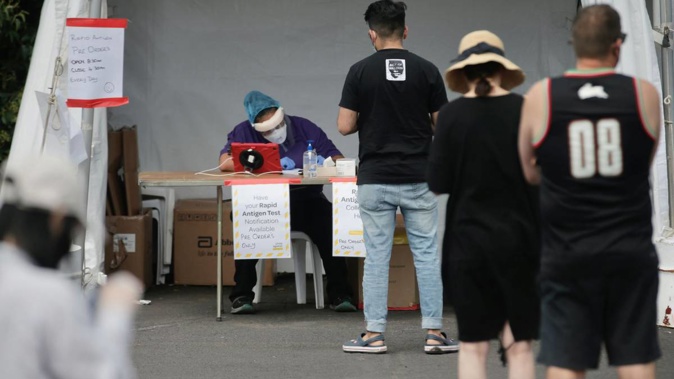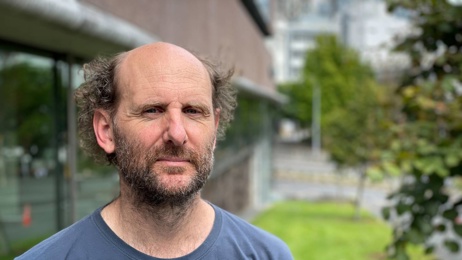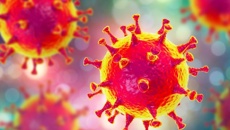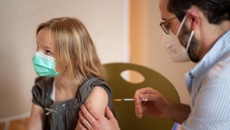
Minister David Parker has tested positive for Covid-19.
He said he tested positive on Sunday and has been isolating at home since. He has not been in the Beehive since Monday.
Parker, Minister for the Environment, is the first MP known to have contracted Covid-19.
Earlier today the Ministry of Health announced 14,633 new community cases of Covid-19 in New Zealand – with the country topping 100,000 cases since the pandemic began.
There are 344 people in hospital including five in intensive care.
Seventeen people who were at the protest at Parliament have tested positive for Covid-19.
However, the ministry said due to reluctance by protestors to get a Covid-19 test, the true number of cases linked to the protest was likely to be much higher.
The ministry said it was concerned about the spread of the virus at the protest.
"We advise all those currently at the protest, or who have been at the protest, who are displaying cold and flu symptoms to get a test and isolate until they receive their result."
Of today's community cases, 3821 were found using PCR tests while the vast majority - 10,812 - were picked up through rapid antigen tests (RATs).
Most of today's reported community cases are in Auckland - 9,305 (RATs and PCR).
The remaining community cases (via PCR and RATS) are across Northland (208), Waikato (1,530), Bay of Plenty (762), Lakes (265), Hawke's Bay (138), MidCentral (175), Whanganui (30), Taranaki (67), Tairāwhiti (60), Wairarapa (52), Capital and Coast (604), Hutt Valley (281), Nelson Marlborough (178), Canterbury (573), South Canterbury (24), Southern (372) and the West Coast (3).
The location of six of today's cases is unknown, the ministry said.
The Ministry of Health reported the detection of 23 Covid-19 cases at the border.
The number of active Covid-19 community cases is 82,105. The seven-day rolling average of community cases, via PCR testing, is 8398.
The 344 people in hospital had an average age of 53.
Middlemore Hospital has the most hospitalised Covid-19 cases with 128.
The other cases are at Northland (5), North Shore (53), Auckland (100), Tauranga (11), Taranaki (1), Waikato (28), Canterbury (4), Southern (4), Hutt Valley (6), Capital and Coast (3) and Tairāwhiti (1) hospitals.
The latest numbers come as New Zealand begins to open up to the rest of the world - and follows a record 14,941 new cases in the community yesterday.
The latest numbers come as New Zealand begins to open up to the rest of the world - and follows a record 14,941 new cases in the community yesterday.
The vaccination status for cases at Northern Region wards (Auckland and Northland hospitals) is as follows:
- Unvaccinated or not eligible: 36 cases (14.3 per cent);
- Partially immunised <7 days from second dose or have only received one dose: 6 cases (2.4 per cent);
- Fully vaccinated at least 7 days before being reported as a case: 110 cases (43.7 per cent);
- Unknown: 61 cases (24.2 per cent).
Across all ethnicities of eligible people aged 12+, 96.5 per cent have had one dose and 95 per cent have had their second dose of Covid-19 vaccine.
For eligible Māori, aged 12+, 90.9 per cent have had one dose, 87.2 per cent have received two and 58.5 per cent of those eligible have been boosted.
For eligible Pacific peoples, aged 12+, 97.9 per cent have had their first dose, 95.7 per cent have received two doses and 56.3 per cent of those due their booster have had it.
Almost 50 per cent of children (5-11) years old have now had one dose of Covid-19 vaccine.
The Ministry of Health reported that 49.6 per cent of children in this age group had received their first dose and 0.6 per cent have had their second jab.
For Māori children, aged 5-11, 29.9 per cent have had one dose and 0.4 per cent have had two.
For Pacific children in this age cohort, 41.5 per cent have had their first dose and 0.8 per cent have received their second.
In New Zealand, there were 176 first doses, 423 second doses, seven third primary doses, 13,707 booster doses; 1175 paediatric first doses and 197 paediatric second doses administered yesterday.
That takes the tally of total vaccinations per dose administered in the country to date to: 4,019,345 first doses, 3,959,359 second doses, 33,421 third primary doses, 2,347,710 booster doses, 240,354 paediatric first doses and 3,269 paediatric second doses.
The ministry had recently been reporting the country's positivity rate for the last 24 hours via PCR testing - however, this figure was not provided today. Yesterday it was 27.98 per cent.
Test positivity is the percentage of positive tests amongst total tests taken. The World Health Organisation's benchmark for a widespread outbreak is anything over 5 per cent.
RATs delayed 'in some areas'
Since Friday, 10.8 million RATs have arrived in the country, following the arrival of 5.2m on Thursday.
The new RATs would flow through the supply chain and into community testing centres, GPs, pharmacies and businesses where they could be accessed by anyone who needed them.
"The wide-ranging and disruptive impact of Covid-19 on the domestic freight and courier networks has had an impact on distribution and delivery times for RATs in some areas."
The ministry said it was working hard to ensure there was a supply of the tests in all communities, including those in remote areas.
From today, the ministry would now report the number of RATs dispatched from its central warehouse - instead of the overall volume, which it had previously been reporting.
The ministry said there had been 2.7m RATs dispatched since Friday morning.
'Unacceptable': Infected swimmer rescued
Meanwhile, a person infected with Covid-19 needed to be rescued by lifeguards at a west Auckland beach yesterday after getting into trouble in the water.
Surf Life Saving Northern Region chief executive officer Matt Williams has blasted the swimmer for going to the beach knowing they had Covid019 calling it "an incredibly poor decision."
"The consequences of this event could impact the viability of our patrols at Bethell's Beach going forward. We ask that anyone who has tested positive for Covid-19, or who is displaying symptoms, stay home so this situation is not repeated."
He said in the first instance the person made a disappointing decision to go to a crowded beach.
"To me, that alone is unacceptable. But for that person to then require rescuing by the Bethells Beach lifeguards, putting those guards and the viability of the service at Bethells itself at significant risk, worsens the situation considerably."
Hospitalisations continued to surge, with 305 reported in hospital including five in ICU or HDU.
There was one death, adding to the five deaths reported on Friday which became New Zealand's deadliest day during the pandemic - in total there have been 56 deaths since the virus hit shores.
Yesterday, the country's reported positivity rate - the percentage of tests that are positive (via PCR tests) - for the previous 24 hours was 27.98 per cent.
The high caseload - and the fact many other countries are now climbing down from their Omicron peaks - means New Zealand now has one of the highest R rates in the world - a measure of the virus' reinfection rate.
"Many countries are much further into this Omicron wave – many countries had this kind of spread a month or so ago," said Auckland University Associate Professor Siouxsie Wiles.
As of Sunday, the Reff (effective reproductive number) for New Zealand stood at 4.23, according to a modeller from Rako science. This means each person with Covid passes it on to another 4.23 others.
While the child vaccine rollout started strong it appears it slowed down in February and has stalled.
Just 50 per cent of children between the age of 5 and 11 have received their first does.
The percentage of tamariki vaccinated around the country is hugely variable - ranging from 62 per cent in Capital and Coast to just 28 per cent in Northland.
Meanwhile, Cabinet is expected to discuss and make decisions about the future of border restrictions today after many have criticised the rules - stating that returning travellers should not have to isolate if they return a negative test.
Prime Minister Jacinda Ardern said it made sense to re-look at the rules now that the virus was circulating widely in the community.
The country's slow, staggered reopening to the world began at 11.59 last night, with the Government lifting MIQ requirements for vaccinated citizens and permanent residents returning from Australia from today.
Just five flights from Australia will arrive on Monday, returning 910 passengers.
Auckland Airport general manager operations Anna Cassels-Brown put this low demand down to the fact that incoming arrivals will still have to self-isolate for seven days.
As the virus takes-off, Cardiologist Professor Harvey White fears New Zealanders are too blasé about the risk of Omicron infection, which has been painted as mild for most people.
He said even "mild" initial infections can lead to serious long Covid symptoms, including higher risk of heart attack and stroke.
Long Covid covers a range of symptoms, from brain fog and impaired thinking to memory loss, anxiety and fatigue, heart disease and stroke.
White predicts 10-30 per cent of people infected with Covid-19 may develop long Covid.
Take your Radio, Podcasts and Music with you









